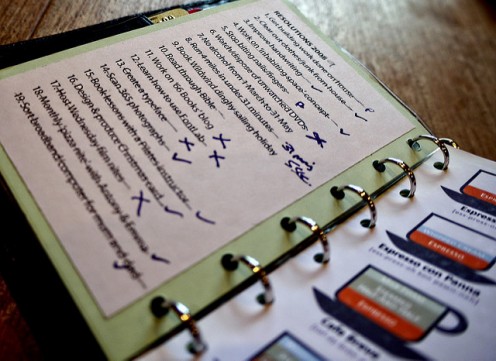How to Set Goals You Can Reach
Too Many Resolutions?

New Year's Resolution Goals Can Cause Stress
It is the time of year when a great many people incur a great deal of needless stress over the annual ritual of setting goals, commonly known as "New Year's Resolutions." The stress arises over worry of failing to achieve the goal or goals, which in turn has much to do with memories of prior failed attempts.
There is no need for this annual stress. We live in stressful times. The economy is in terrible shape; people are losing jobs and even their homes on a daily basis; goods we need are being priced out of reach. There is plenty of stress to go around with all of those things. Why add in more stress with your resolutions?
Personally, I refuse to add this stress to my own life, and over twenty-five years ago, made the only "New Year's Resolution" I've ever kept: I "resolved" to never make any more New Year's resolutions.
Timing is Everything
If you don't want to follow my lead, that's fine. Just be sure to set realistic goals that won't overstress you.
First, you don't need to base your resolutions or goals on the start of a new year. It might not be a good time to do that. In fact, it probably is one of the worst times to try and start a new regime of any kind.
The hustle and bustle of the holidays has ended, and everyone is coming down from their holiday high into an anti-climactic place of just being dog-tired from all the rushing around. Your body and mind both need time to rest and recuperate.
After going over-and-above from Thanksgiving (sometimes earlier), until after the various December holidays, shopping, cooking, cleaning, visiting, cleaning, visiting, cooking, cleaning...shopping, ....you get the picture. By the time January 1st rolls around, for the most part, we are physically and emotionally spent.
Add to that the fact that tax forms start showing up in the mail, and then everyone is stressing about April 15th looming.
Give It a Rest
Allow your body and mind some down-time after all of that holiday rushing around. This is the time to catch up on those books you wanted to read, the new games you want to play, the long phone calls with friends.
This is the time for those long soaks in a relaxing bubble bath, or hot tub, naps in the afternoon (well, on the weekends, anyway, for those not yet retired) and playing with your pets, who may have felt neglected during the holidays.
It is still the dead of winter, and that lack of daylight drains the energy from many people. For some, it even manifests as a medically-defined ailment known as Seasonal Affective Disorder.
Interesting, don't you think, that the condition's initials spell "SAD?." That's how many people feel when winter has them in its dark and icy grip. It is a form of depression, and makes doing anything, even normal daily routines, much harder.
Mother Nature Refreshes and Renews Early in the Year, Too


Spring Into Your Resolutions
With the coming of Spring, the light is coming back, the weather is starting to improve, the days get longer, and our physical and mental energy become renewed as well.
Now is the time to go after new projects, goals, resolutions, or whatever name you choose to assign.
A word of caution, however: choose your goals carefully, and just because you're feeling a new surge of energy, do not over-estimate your "carrying capacity." I offer a quote from the inscription of the ancient Greek temple at Delphi which advises, "Know thyself." Understand your own limitations and tolerance for multi-tasking.
The only true failure is the failure to keep trying."
How Do We Manage This?
If Spring is a good time to start new projects, it doesn't necessarily follow that it is a good time to start four, six or a dozen. Don't cause yourself stress by trying to do too many things at once.
For example, if you want to quit smoking, focus on that, and don't try to go on a diet at the same time. In fact, those two particular goals are the single most difficult pair most folks will face, and they will 'argue' with each other. A great many people end up putting on weight as they stop smoking, so trying to lose weight at the same time is doing things backwards.
Get off the smokes first, and when you feel fully clear of them, that is the time to approach the dieting issue. Yes, it might be another year. Don't be hard on yourself. That's the whole idea, here--eliminate additional stress--especially self-imposed stress.
Patience is the keyword here, and to use another familiar saying, "Rome wasn't built in a day." Pick your battles of will, and focus on the big ones one at a time.
If your list includes other smaller issues, such as re-organizing your office, or going through the closet and weeding out things you no longer use, then of course it makes sense to do a certain amount of multi-tasking. We multi-task all the time. Well, at least we women do; we are very comfortable with the concept of while the washing machine is running, we can vacuum the carpet.
Starting a volunteer activity is another type of thing that can be accommodated while you are doing something else. In fact, it is an excellent choice to accompany a bigger, harder thing such as the dieting or stopping smoking, as it will give your brain something else to think about.
Just be sure the activity is compatible with your goal. For example, don't volunteer at a food kitchen for the homeless if dieting is your objective. You will only torment yourself and cause that added stress.
Break It Up!
Just as with any physical fight, you want to end it, break it up, stop the fighting. In the realm of resolutions and goals, the way to do this is to plan for smaller bites.
Don't think, "Oh, I'm going to get back in shape by running 5 miles every day." Wait! What? Are you even accustomed to running at all? Try walking for a certain amount of time, instead.
It is much easier to set smaller goals that can be more easily reached, and then set another smaller one, and so forth, until the ultimate goal is achieved. This is so much more relaxing and easy to do. And, you don't have to ever beat yourself up for being a "failure." Even if you do backslide at some point, no matter what the final desired result, let it go.
Tomorrow is another day, and you can simply wipe the slate and start again. You won't have lost enough to worry about, and you won't be stressing yourself out.
So, whether it's dieting, smoking cessation, writing a hundred new articles, or going back to school; take baby steps, do one thing at a time, and be kind to yourself.
Baby Steps
A class I attend for stress management offers this means of checking on your goals; they should be "smart:"
S = Specific
M = Measurable
A = Actionable
R = Realistic
T = Timeline
By checking in with these criteria, we can be sure of not biting off more than we can chew, and of not getting overwhelmed by the larger picture. "I'm going to walk for 10 minutes 3 days this week," is very specific, it is measurable, it is an action we can take, it is realistic, and it has a definite timeline to happen. This is a goal that can be met.
On the other hand, setting a goal such as "I'm going to lose 40 pounds," is perhaps admirable, but not very specific; there is no timeframe, and it is too much to consider all at once.
Baby steps, folks, baby steps. I struggle with this myself. I have a huge project to do in my office, and I am continually bogged down by seeing all of it. I, too, need to remind myself to start from where I am, and just aim for a few small successes at a time.
© 2011 Liz Elias








